Lineberry’s Champions of Accessibility Award highlights a banner year for Ph.D. Program
The news that Ph.D. student Sarah Lineberry has been named a winner of VCU’s Champions of Accessibility Award for 2021 capped a notable academic year for her and her colleagues in the School of Social Work doctoral program.
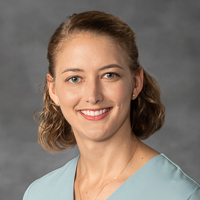
Lineberry was one of nine winners university-wide and one of only two students to earn the champions honor, awarded annually by VCU’s Transforming Accessibility Initiative (TAI) for exemplary work to create access and inclusion for people with all forms of dis/ability.
“Sarah’s award recognizes her tireless work to improve access to COVID-19 testing and vaccination, particularly for people with intellectual and developmental disabilities,” says social work Associate Professor Matthew Bogenschutz, Ph.D., who nominated her. “Her work is vitally important to improve testing and vaccine access for people with disabilities, who have largely been neglected in vaccine outreach efforts. If we’re interested in improving health equity, people with disabilities must be part of the plan, and Sarah’s work has done much to make sure that people who coordinate COVID responses have the tools they need to reach people with disabilities.
“Sarah’s drive to serve the needs of people with disabilities is truly social work in action. She has connected national leadership groups with local COVID response teams, she is connecting research with practice realities, and she has been a tireless advocate for improving health equity for people with disabilities in our response to COVID-19.”
The award continues a legacy of involvement and advocacy at the School of Social Work. As a graduate student in 2019, alum Lynne Fetter (M.S.W.’21/SW) was honored as a champion, and the school was recognized in 2018 as a departmental partner. Lineberry says initiatives like the TAI are vital in increasing awareness of the needs of the disability community.
“I’m so grateful to be honored as a 2021 Champion of Accessibility and for the opportunity to use my experiences to support my community during the COVID-19 pandemic,” she says. “I have been working with the Richmond City Health District since May 2020, first as a volunteer and then as a contractor, to organize community testing and vaccination efforts.
“I have been able to use my experience as a case manager and my research on health disparities for people with disabilities to advocate for accessibility at community events. I currently work with the home vaccination program to reach folks who are not able to get vaccinated in the community.”
Dr. Bogenschutz adds that Lineberry’s work has been widely recognized not only in the Richmond area but also nationally, and was included in a report to the Biden Administration about the COVID response for people with disabilities.
Lineberry says a community-based participatory research class in the spring semester that included a service learning component triggered her interest “in how people with disabilities and chronic health conditions were, or were not, being prioritized in the COVID-19 vaccine rollout, and in the amazing advocacy work in that area.”
Lineberry connected through Twitter with Kara Ayers, Ph.D., director of the University of Cincinnati’s Center for Dignity in Healthcare for People with Disabilities. Ayers invited Lineberry to join the workgroup for a project compiling a data dashboard on how states were defining COVID-19 vaccine eligibility for people with intellectual and developmental disabilities (IDD), chronic health conditions and caregivers.
“There was hardly any information about how people with IDD were impacted by COVID-19, which meant that many states didn’t prioritize that population for vaccination,” Lineberry says. “The research we do have suggests that people with IDD are more likely to contract COVID-19, especially if they live in congregate settings, and are more likely to have poor outcomes if they do get sick.”
Dr. Ayers presented findings (starting on page 45) to a national COVID-19 equity task force as part of a broader problem and the need to include people with IDD in public health surveys and research, Lineberry says. “My work with Dr. Ayers really highlights how policies and research, or a lack thereof, have real-world implications for people. My ultimate goal is to work in policy at some level, so I was incredibly grateful to have had this opportunity so early in my academic career.”
VCU Graduate Research Symposium
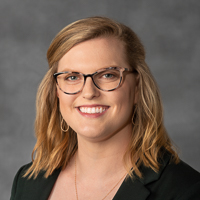
Jennifer Murphy 
Camie Tomlinson 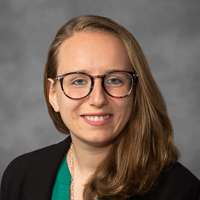
Angela Matijczak
Ph.D. social work students Jennifer Murphy, Camie Tomlinson and Angela Matijczak were honored with outstanding submission awards as co-presenters of two posters this spring at the university’s annual Graduate Research Symposium.
Murphy was lead presenter of Victimization and Psychological Wellbeing among Sexual and Gender Minority Emerging Adults: Testing the Moderating Role of Emotional Comfort from Companion Animals, and Tomlinson was the lead of Relations Between Sexual and Gender Minority Stress, Personal Hardiness, and Psychological Stress in Emerging Adulthood: Examining Indirect Effects via Human-Animal Interaction. The two posters are based on papers by Murphy et al. in the Journal of the Society for Social Work and Research (in press) and Tomlinson et al. in the journal Youth and Society.
“Camie and Jen are so deserving of this award,” says Shelby McDonald, Ph.D., another co-author and recently departed social work associate professor. “They are wonderful colleagues, incredibly resilient, and a joy to work with, as are the other two student co-authors on these presentations, Angela and Kelly O’Connor, a psychology Ph.D. student. I’m delighted to see their hard work and dedication to rigorous anti-oppressive research be recognized.”
Murphy, Tomlinson and Matijczak provided additional context about their work.
What is the importance of the work represented in the two posters?
“The analyses presented by these posters at the Graduate Research Symposium examined relations between LGBTQ+ stressors, human-animal interaction, self-efficacy and psychological well-being among LGBTQ+ emerging adults. The results of the poster Jen presented indicated that relationships with pets may be an important protective factor against the harmful effects of identity-based stressors, such as LGBTQ-related victimization, on self-esteem; however, we didn’t find that comfort from pets protected against anxiety or depressive symptoms. In the study that Camie presented, we found that exposure to LGBTQ+ microaggressions may lead LGBTQ+ emerging adults to seek out relationships with their pets, which in turn, may promote self-efficacy, a factor associated with resilience.
“Given that LGBTQ+ youth are experiencing a disproportionately higher rate of minority stressors and situations like employment issues or housing insecurity, it is important for future research to continue to explore how, and for whom, human-animal interaction provides benefits. Also, it is important that mental health providers and community services consider LGBTQ+ young adults’ relationships with their pets and provide resources that can help individuals maintain these beneficial relationships with their pets.”
Why is participating in the symposium important and what does the judges’ validation mean?
“Participating in the Graduate Research Symposium was important to us because it allowed us to share our work with other students and faculty across the university and to see what other research is taking place at VCU. With conferences and symposiums taking place online, it is easy to feel isolated and like your project isn’t reaching people outside of your research team; being recognized by the judges reminded us of the importance of the work we have done over the last several years with this study and with Dr. McDonald.”
How does the Ph.D. Program help facilitate and nurture these kinds of collaborative efforts?
“Our work with Dr. McDonald has provided us with multiple opportunities to collaborate with fellow students and other faculty members on presentations and papers. These presentations at the Graduate Student Research Symposium are good examples of this, as the papers that these presentations were based on included collaborations with graduate students from VCU Department of Psychology and the University of Florida and with other faculty members from within VCU’s School of Social Work and the University of Michigan School of Social Work. As doctoral students, it has been very helpful to work with such a variety of co-authors who bring their own expertise to each of these papers/presentations.”
Published works highlights
Angela Matijczak led a study exploring how social support from humans and comfort from companion animals can help LGBTQ+ young adults deal with microaggressions. The published article was featured on the cover of the January issue of the journal Behavioral Sciences. The study – “The Moderating Effect of Comfort from Companion Animals and Social Support on the Relationship between Microaggressions and Mental Health in LGBTQ+ Emerging Adults” – included co-authors McDonald, Camie Tomlinson and Jennifer Murphy. More details
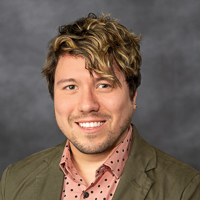
Ph.D. student Mauricio P. Yabar has published an article, “Narratives in Sex Offender Management Laws: How Stories About a Label Shape Policymaking,” in The Journal of Sociology & Social Welfare. “This work promotes the development and implementation of humane sexual offending policies that are based on scientific evidence rather than emotional appeals to public outrage,” he says. “This publication represents a milestone in a trajectory of research that will explore the collateral effects of sexual offending laws on the families of individuals convicted of these crimes.”
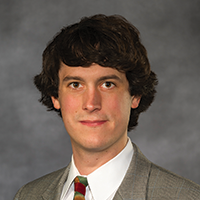
Tommy Buckley 
Sunghwan Cho 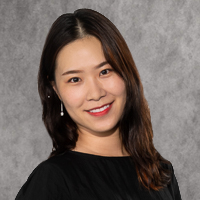
Seon Kim
Ph.D. students Tommy Buckley, Sunghwan Cho and Seon Kim were co-authors of “Measurement indicators of age-friendly communities: Findings from the AARP Age-friendly Community Survey,” published in The Gerontologist. Assistant Professor Kyeongmo Kim, Ph.D., was lead author, and Professor and Ph.D. Program Director Denise Burnette, Ph.D., was also a co-author.

Ph.D. student Nicole George and Associate Professor Hyojin Im, Ph.D., published “‘It hurts so much to live for nothing’: Lived experiences of substance use among refugee youth in displacement” in the International Journal of Mental Health and Addiction.
Graduate outcomes
The program is excited to share next steps for six of our Ph.D. graduates from the past year.
Tommy Buckley, Ph.D.
Tommy Buckley, Ph.D., successfully defended his dissertation, “Sense of Community Among Older Adults in Puerto Rico Two Years After Hurricane Maria,” in June.
Dr. Buckley will be a postdoctoral associate in the Center for Interventions to Enhance Community Health (CiTECH) through the School of Social Work and Department of Psychiatry at the University of Pittsburgh. In this postdoc, he will be working on adaptation, utilization and assessment of evidence-based practices to improve mental health and well-being among older adults. Additionally, he will work on developing his own research agenda and projects, which generally, will be mental health and well-being of older adults following natural disasters and the relationship between community and social support with health and well-being for older adults.
Anna Cody, Ph.D.
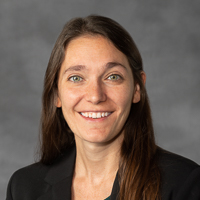
Anna Cody, Ph.D., successfully defended her dissertation, “Children’s Participation Rights in Child Welfare Systems: Identifying Opportunities for Implementation,” in November 2020.
Dr. Cody is an assistant research scientist with the African Programming & Research Initiative to End Slavery (APRIES) in the University of Georgia School of Social Work. The initiative is an international consortium of anti-slavery researchers and policy advocates seeking to reduce the prevalence of modern slavery in Sub-Saharan Africa (SSA) by transforming the capacity of community-engaged agencies to implement prevention, prosecution and protection strategies. Cody serves as a qualitative research analyst, currently supporting qualitative analysis for a mixed methods study that aims to estimate prevalence of child trafficking in Sierra Leone and Guinea, identify gaps in anti-trafficking prevention initiatives and identify gaps in services for survivors of child trafficking and their families.
She brings an expertise in a variety of qualitative methodologies, including: team-based template analysis, thematic analysis, constructivist grounded theory, ethnographic methods, qualitative comparative analysis, content analysis and policy analysis. Dr. Cody has a particular interest in strengthening team-based qualitative methodologies used for research involving large-scale qualitative data and for enhancing impacts on policy and practice through actionable translation of qualitative research findings.
Kimberly Compton, Ph.D.
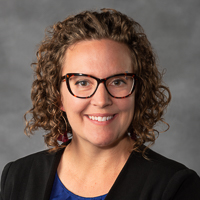
Kimberly Compton, Ph.D., successfully defended her dissertation, “Pro-Environmental Behaviors Among Environmental Justice Advocates: A Critical Race Perspective,” in April.
Dr. Compton is a full-time instructor for the M.S.W. Program in the online format at the VCU School of Social Work. She has developed a range of teaching expertise: online, face-to-face, as a course developer and as a field instructor. As a practitioner, instructor, and researcher, she is actively interested in unexpected intersections of multiple disciplines, spaces, and vocations with social work.
For Dr. Compton, social work has a lot to offer other disciplines, but it also is in need of its own growth and transformation. She explores these opportunities through her work in the community and across disciplines. She merges these intersections in the classroom, and has even developed an elective course giving students the tools to creatively invite the natural environment into their social work practice.
David Conley, Ph.D.
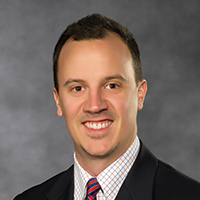
David Conley, Ph.D., successfully defended his dissertation, “Analysis of Stigmatic Content in State Mental Health Legislative Proposals,” in June 2020.
Dr. Conley is an assistant Professor at the University of North Carolina Wilmington School of Social Work. His research focuses on political social work, social policy and behavioral health, including the impact that social workers (and other advocates) can have on creating and influencing policy and politics.
Laura E.T. Swan, Ph.D.
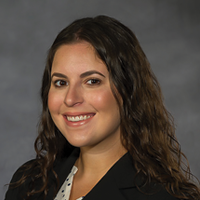
Laura E.T. Swan, Ph.D., successfully defended her dissertation, “Pathways to Reproductive Autonomy: Structural and Relational Facilitators of Contraceptive Access in the US,” in March.
Dr. Swan is a postdoctoral research associate with the University of Wisconsin-Madison in the Department of Population Health Sciences. She will be studying reproductive health equity under Dr. Tiffany Green in the Green Inequality Lab. Some specific projects she will be working on involve examining provider bias in reproductive healthcare and the impact of COVID-19 on racial/ethnic disparities in contraceptive access.
Keith J. Watts, Ph.D.

Keith J. Watts, Ph.D., successfully defended his dissertation, “The Role of Community Belongingness in the Mental Health and Well-Being of Black LGBTQ Individuals,” in May.
Dr. Watts is an assistant professor at the University of Kentucky College of Social Work; member of the International Partnership for Queer Youth Resilience (INQYR), which is housed at the University of Toronto; and Center for Youth Engaged Research to Prevent and End Youth Homelessness (C-PEYH), which is housed at VCU.
Categories Alumni, Education, Program news, Publications, Research, StudentsTagged Accessibility, Angela Matijczak, Anna Cody, Camie Tomlinson, David Conley, Denise Burnette, Graduate Research Symposium, Human-Animal Interaction, Hyojin Im, Jennifer Murphy, Keith Watts, Kimberly Compton, Kyeongmo Kim, Laura Swan, LGBTQ+, Lynne Fetter, Matthew Bogenschutz, Mauricio Yabar, Nicole Campbell, Ph.D. Program, Sarah Lineberry, Seon Kim, Shelby McDonald, Sunghwan Cho, Thomas Buckley